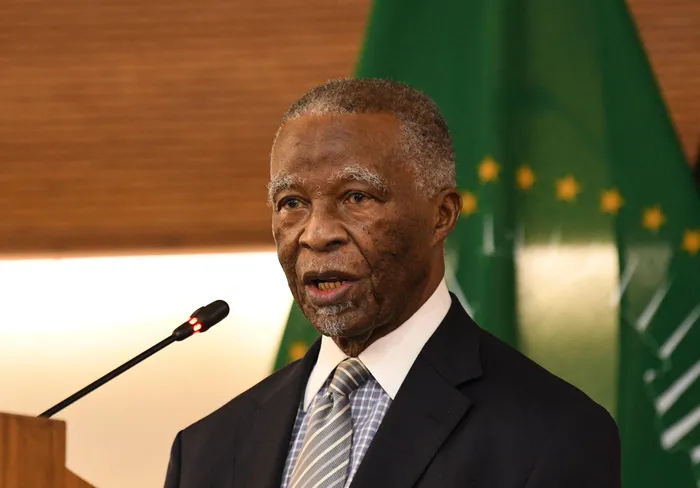Concerns over R700 million budget led to Mbeki's withdrawal from National Dialogue

Seven leading foundations have withdrawn from the National Dialogue Convention, citing concerns over rushed planning, loss of citizen leadership, and lack of transparency in the process.
Image: file
Former President Thabo Mbeki has shed light on the reasons behind his foundation's withdrawal from the National Dialogue, a government-led initiative aimed at bringing South Africans together to discuss the country's biggest problems.
According to Mbeki, one of the primary reasons for the withdrawal was the uncertainty surrounding the R700 million earmarked for the National Dialogue.
Mbeki's foundation, along with other prominent legacy foundations, including the Steve Biko Foundation, Desmond and Leah Tutu Foundation, and FW de Klerk Foundation, withdrew from the National Dialogue Convention scheduled to kick off on Friday.
The foundations cited concerns over the rushed timeline, inadequate preparation, and shift towards government control as reasons for their withdrawal.
"We feel the organisation of the matter was not entirely honest as to where the funds will be directed," Mbeki said.
"This is due to our belief that core principles meant to underpin the whole National Dialogue have been violated in the rush to host a gathering on 15 August."
In a joint statement, the foundations highlighted several issues, including a rushed timeline saying that the convention's constrained logistics have turned it into a performative milestone rather than a meaningful launch of a national process.
The foundations also cited the absence of a confirmed, approved budget allocation and last-minute commitment of initial funds have made sound preparation impossible and deep disagreements exist within the Preparatory Task Team over the nature of the dialogue, readiness, governance, and risk.
The foundations have proposed rescheduling the convention to after October 15, 2025, to allow for adequate preparation, coherence, and participatory integrity.
"Deadlines cannot override substance," they emphasised. "Dialogue cannot be built on haste."
A senior government official said another reason for the withdrawal of the former president and the foundations was the inclusion of controversial Tshwane University of Technology (TUT) Vice-Chancellor and Principal, Prof Tinyiko Maluleke.
Maluleke is at the heart of a TUT controversy, facing accusations of appropriating the concept of a Sekhukhune campus in Limpopo.
This alleged theft led to the construction of a campus in Giyani instead, leaving hundreds of Sekhukhune youth without the promised university.
On July 16, President Cyril Ramaphosa announced his appointment as co-chair of the National Dialogue Eminent Persons Group (EPG).
The National Dialogue is an inclusive, citizen-driven process focused on developing a vision and plan for South Africa for the next 30 years.
The Congress of South African Trade Unions (Cosatu) expressed strong disapproval regarding the proposed R700 million budget for the National Dialogue.
“Like many other rational South Africans, Cosatu was astonished that such a figure could even be suggested. This arbitrary budget number should be considered a verbal slip and a reckless error, best forgotten,”
“While Cosatu understands that this proposal stems from a few government officials and others, it is incredibly imprudent and insensitive given the public's frustrations, especially those of the working class. This group has endured severe austerity cuts to essential services like health, education, policing, and home affairs. They have been forced to make sacrifices while struggling with the increasing cost of living in a fragile economy burdened by extreme unemployment, poverty, and inequality,” Cosatu said in a statement.
Despite the withdrawal of the legacy foundations, President Cyril Ramaphosa has confirmed that the first national convention will proceed as scheduled.
The Presidency further distanced itself from the estimated R700 million price tag for the dialogue.
“The Presidency wishes to confirm that all budgetary processes regarding the National Convention are consistent with the Public Finance Management Act (PFMA).
“The Inter-Ministerial Committee, which is chaired by Deputy President Paul Mashatile and comprises all relevant government departments to coordinate government’s contribution towards the National Dialogue, has been working to mobilise resources for the convention and manage costs,” the presidency said in a statement on Sunday.
The Presidency said there was a call for collaboration with other stakeholders to reduce the costs of the National Dialogue.
“UNISA has offered to host the first National Convention and provide associated goods and services free of charge, as it stands, venues have been secured for the plenary, two overflow venues with livestreaming , 10 breakaway venues, dining area and work areas,” the statement read.
“In addition, UNISA is providing facilities for an Operations Centre, which has been running over the past week, catering, ushers, AV services, printing of discussion documents, signage, conference bags, notepads, pens and WiFi.”
The statement added that the costs of the first convention were being funded from the existing budgets of NEDLAC and the Presidency for secretariat support, communications and logistics and that the provisions in the Appropriation Act and the PFMA will be used to reimburse the Department of Employment and Labour and NEDLAC in the Adjustments Budget later this year.
mashudu.sadike@inl.co.za
Related Topics: